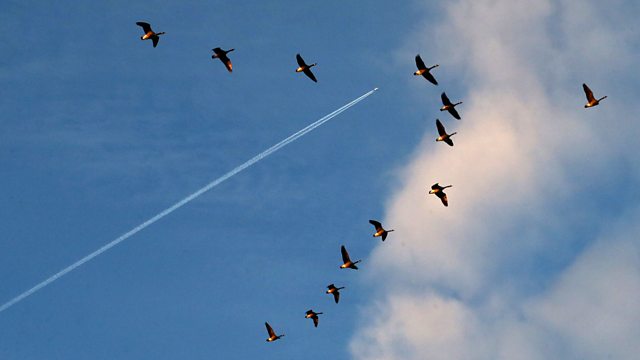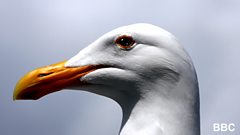Natural Navigation
Unlocking the brain’s ability to work out where we are, and the ability of migratory birds to navigate thousands of miles. With Tim Birkhead, Tristan Gooley and Jennifer Groh.
Is satellite navigation affecting our ability to find our way around using natural signs? Bridget Kendall explores the phenomenal computational power of the human brain to work out where we are and the navigational ability of migratory birds to fly thousands of miles. With Behavioural Ecologist Professor Tim Birkhead, Navigator and Explorer Tristan Gooley and Neuroscientist Professor Jennifer Groh.
Photo: Birds flying in formation (Getty Images)
Last on
Clip
-
![]()
Where the “magnetic compass” in migratory birds might be located
Duration: 00:36
Chapters
-
Tim Birkhead
Unlocking the magnetic sense in birds
Duration: 11:00
Tristan Gooley
How to use natural signs in urban and rural landscapes to find our way around
Duration: 09:18
Sixty Second Idea:
Jennifer Groh proposes a brain pacemaker that would help musicians to play faster
Duration: 00:16
Jennifer Groh
The human brain’s systems for navigating space may be the systems for thought itself
Duration: 17:04
Tim Birkhead
![Tim Birkhead]() Professor Tim Birkhead is Professor of behavioural ecology at the University of Sheffield in the UK and author of Bird Sense: what it’s like to be a bird. After decades of watching and studying birds he began to recognise the incredible range of senses they possess including navigation skills like echolocation and a well-developed magnetic sense which is essential for finding their way during migration.
Professor Tim Birkhead is Professor of behavioural ecology at the University of Sheffield in the UK and author of Bird Sense: what it’s like to be a bird. After decades of watching and studying birds he began to recognise the incredible range of senses they possess including navigation skills like echolocation and a well-developed magnetic sense which is essential for finding their way during migration.Tristan Gooley
![Tristan Gooley]()
Tristan Gooley is a navigator, explorer and writer. His book The Natural Navigator explores how we can find our way using natural signs. He has walked with and studied the methods of the Tuareg, Bedouin and Dayak people in some of the remotest regions on Earth and is the only living person to have both flown solo and sailed singlehanded across the Atlantic. He says that natural navigation is something we all do and one of the key questions he asks people to ask themselves is: “which way am I looking”. He says that we would be amazed even in an urban environment at the clues around us which help with that answer: from the flow of people along a busy street, to lichen on buildings and piles of dust or leaves on the road-side.
Jennifer Groh
![Jennifer Groh]()
For humans, knowing where things are seems effortless. Yet, as Professor Jennifer Groh, a Neuroscientist at Duke University in the USA explains our brains devote tremendous power to work out the simplest details about spatial relationships. Tasks we take for granted, like going to the local shop or finding our mobile phone take coordination across different sensory and motor domains. Very recently The Nobel Prize for physiology or medicine was awarded to three scientists who discovered what was described as the brain's "GPS system" – in other words its navigation system. Jennifer explains the contribution that this discovery has made to our understanding of how we find our way around. She makes the case that spatial processing takes up such a large part of the human brain function that the brain’s systems for thinking about space may be the systems of thought itself.
60 Second Idea to Change the World
![60 Second Idea to Change the World]()
Jennifer Groh proposes a brain pacemakers that would help musicians to play faster. Eight years ago Jennifer started to learn to play the Banjo. But after five years, despite regular practise, her progress began to decline because she could not increase her finger speed. She proposes a brain pacemaker that would speed up activity in the motor cortex to help her and fellow musicians move their fingers faster. She says that humans are unusual in that they have control over how fast they can walk and talk. They can choose to play a song slowly or quickly, whereas birds by comparison sing their song at a particular stable tempo. We don’t know how the brain controls the tempo of music and language, and we don’t know how we get faster with practice but a brain pacemaker might help.
Broadcasts
- Sat 18 Oct 2014 21:05GMT�鶹��ƵAV World Service Online
- Sun 19 Oct 2014 09:05GMT�鶹��ƵAV World Service Online
- Mon 20 Oct 2014 02:05GMT�鶹��ƵAV World Service Online
Do you find it difficult to get a good night’s sleep?
Podcast
-
![]()
The Forum
The programme that explains the present by exploring the past








